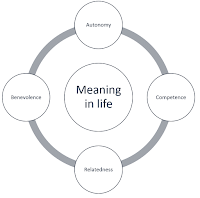The importance of autonomous functioning As research into self-determination theory has shown there is a strong connection between people’s autonomous functioning and their wellness, their open, engaged and healthy functioning. When people feel autonomous they feel they can make their own choices and follow their own preferences. This does not mean they will be selfish, over individualistic, or self-sufficient. In fact, under good enough conditions, people will actively attempt to internalize and integrate the norms, rules and values of their environment, in other words make them their own. This process of internalizing and integrating external norms, rules and values will happen best 1) when they are transmitted in an autonomy supportive rather than a controlling way, and 2) when these norms, rules and values are congruent with the basic psychological needs for autonomy, competence, and relatedness (Ryan & Deci, 2011).




